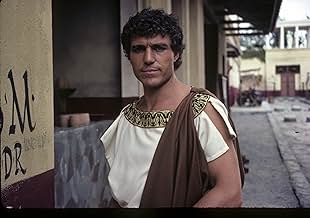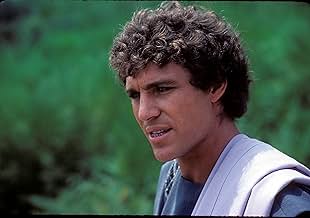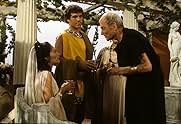Os Últimos Dias de Pompéia
Título original: The Last Days of Pompeii
- Minissérie de televisão
- 1984
- 5 h 10 min
AVALIAÇÃO DA IMDb
7,0/10
668
SUA AVALIAÇÃO
Adicionar um enredo no seu idiomaRich residents of Pompeii enjoy luxury life until Vesuvius erupts, burying the city. inhis daughter Julia, cultured Greek Glaucus, gladiator Lydon, nobles Antonius and Ione, villainous pries... Ler tudoRich residents of Pompeii enjoy luxury life until Vesuvius erupts, burying the city. inhis daughter Julia, cultured Greek Glaucus, gladiator Lydon, nobles Antonius and Ione, villainous priest Arbaces, and persecuted Christian slaves.Rich residents of Pompeii enjoy luxury life until Vesuvius erupts, burying the city. inhis daughter Julia, cultured Greek Glaucus, gladiator Lydon, nobles Antonius and Ione, villainous priest Arbaces, and persecuted Christian slaves.
Explorar episódios
Avaliações em destaque
79 A.D. 52 years into Pax Romana and 46 years after the death of Christ, Decadent Pompeiians make life uncomfortable for Christians when they aren't outright killing them. Wealthy citizens struggle to relate to their slaves whilst social climbing. Slaves, as depicted here generally appear more concerned with self-esteem issues than how back-breaking their labour is and the volcano behind them is set to blow any minute.
A decadent coast city with flaky rich people, wide-scale prostitution, and a dangerous cult all co-existing while the ground shakes? It is like modern Los Angeles only without the hard drugs or racial tensions.
The easiest criticism to make about this mini-series is that it tries to tell too many stories at once and tells none of them properly with an ending alluded to not merely by history but the title. A grab bag of subplots on offer have a few intriguing elements amidst the mostly boring ones but added together they make for an incoherent muddled mess interlocking too neatly at the end.
There are a lot of examples of clunky historical epic expositional dialogue beyond the narrator at the beginning which turns into heavy-handed metaphysical discussion the viewer might not be ready for.
Whatever potential appeal this mini-series might have had appears to have heavily been placed upon a location shoot and legacy casting of actors who had triumphed in roles set in the ancient world.
Olivia Hussey and Ernest Borgnine had both been in Jesus of Nazareth (1977) along with Lord Laurence Olivier who had of course also appeared in Spartacus (1960). Anthony Quayle had been in Masada (1981) and The Fall of the Roman Empire (1964). Brian Blessed and David Robb had been in I,Claudius (1976). Brian Coburn was in Julius Caesar (1979) and The Day Christ Died (1980). Howard Goorney was in Antony & Cleopatra (1981) and Peter & Paul (1981). Stephen Grief was in The Cleopatras (1983). Nicholas Clay played the title role in The Search For Alexander the Great (1981). Howard Lang had been in Ben-Hur (1959). Marilu Tolo is credited as having been in several gladiator movies in the 1960s.
As for the much celebrated homoerotic undertones, I cannot really say I know what those might be but my guess would be they has to do with Lydon - the gladiator played by Canadian actor Duncan Regehr. Different people look for different things I reckon and because of it they might see things which are not there.
A decadent coast city with flaky rich people, wide-scale prostitution, and a dangerous cult all co-existing while the ground shakes? It is like modern Los Angeles only without the hard drugs or racial tensions.
The easiest criticism to make about this mini-series is that it tries to tell too many stories at once and tells none of them properly with an ending alluded to not merely by history but the title. A grab bag of subplots on offer have a few intriguing elements amidst the mostly boring ones but added together they make for an incoherent muddled mess interlocking too neatly at the end.
There are a lot of examples of clunky historical epic expositional dialogue beyond the narrator at the beginning which turns into heavy-handed metaphysical discussion the viewer might not be ready for.
Whatever potential appeal this mini-series might have had appears to have heavily been placed upon a location shoot and legacy casting of actors who had triumphed in roles set in the ancient world.
Olivia Hussey and Ernest Borgnine had both been in Jesus of Nazareth (1977) along with Lord Laurence Olivier who had of course also appeared in Spartacus (1960). Anthony Quayle had been in Masada (1981) and The Fall of the Roman Empire (1964). Brian Blessed and David Robb had been in I,Claudius (1976). Brian Coburn was in Julius Caesar (1979) and The Day Christ Died (1980). Howard Goorney was in Antony & Cleopatra (1981) and Peter & Paul (1981). Stephen Grief was in The Cleopatras (1983). Nicholas Clay played the title role in The Search For Alexander the Great (1981). Howard Lang had been in Ben-Hur (1959). Marilu Tolo is credited as having been in several gladiator movies in the 1960s.
As for the much celebrated homoerotic undertones, I cannot really say I know what those might be but my guess would be they has to do with Lydon - the gladiator played by Canadian actor Duncan Regehr. Different people look for different things I reckon and because of it they might see things which are not there.
I would just like to say, that I agree with many fans, that Duncan made the series what it was, with his great performance as the Gladiator Lydon. It was a very haunting tale of love, violence and destruction, in ancient Pompeii. I also thought that Nicholas Clay did a great job as Glaucus in the series. I had just started college, at the time this series was shown on television in the UK, during Christmas 1984. Not long after this series was shown, I watched My Wicked, Wicked Ways, in 1985 with Duncan portraying Errol Flynn. I thought that he did a good job in this film, even though it was a poor production, and quite hammy!! But anything that Duncan Regehr is in, is worth watching, just to see him...
10scrib521
With a remarkable cast & spiffed up story based on the book, this made-for-TV movie was a joy to watch. All that being said, I must assert that Duncan Regehr totally sold this series - Yes, he was Damn Hot as the gladiator Lydon. Following the splendid job he did playing Erroll Flynn in "My Wicked, Wicked Ways", I was hoping Hollywood would snatch him up & turn out blazing action/adventure flicks with a film noir edge - but nothing happened, or possibly even a remake of "Captain Blood", but still - no. From 1985 on, insipid, look-alike pretty boys got all the leads, it seems. Aside from that, this version of the "Last Days of Pompeii" had a stellar cast with some stunning scenes, sets, & special effects, & um, oh - the gladiatorial fight sequences were every bit of okay, too!
I´ve first seen in 1985, and was the first time that a movie touch my heart, then I read the book and I think that the traslation to the movie is very difficult, but Peter Hunt give us a masterpiece. The adaptation is amazing, and the cast is excellent specially by the beauty from Argentinian actress Olivia Hussey as Ione and Franco Nero as the the cruel Arbaces the Obscure.
I recommend as one of the best mini-series of all time.
I recommend as one of the best mini-series of all time.
I wish that Carmen Culver & Edward Bulwar Lyon lived in the same era & that Carmen Culver read over his writings at the time, & had rewritten it for him, so that her work would be the actual "The Last Days of Pompeii" novel.
The truth is, the original was horrible. Edward Bulwar's writing of the book was very cheesy.
I will never understand why the critics panned her work. Her miniseries was really wonderful. After seeing it again after so many years, I still absolutely loved it.
A 100% romantic movie.
The truth is, the original was horrible. Edward Bulwar's writing of the book was very cheesy.
I will never understand why the critics panned her work. Her miniseries was really wonderful. After seeing it again after so many years, I still absolutely loved it.
A 100% romantic movie.
Você sabia?
- CuriosidadesCarmen Culver's television script added so many new characters, and changed so many sequences from the 1834 novel by Edward George Bulwer-Lytton that her version merited a paperback novelization of its own, written by David Wind.
- ConexõesReferenced in Minty Comedic Arts: 10 Things You Didn't Know About V (2024)
Principais escolhas
Faça login para avaliar e ver a lista de recomendações personalizadas
- How many seasons does The Last Days of Pompeii have?Fornecido pela Alexa
Detalhes
- Data de lançamento
- Países de origem
- Idioma
- Também conhecido como
- The Last Days of Pompeii
- Locações de filme
- Empresas de produção
- Consulte mais créditos da empresa na IMDbPro
Contribua para esta página
Sugerir uma alteração ou adicionar conteúdo ausente










































